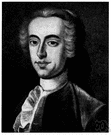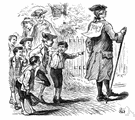Tory
Also found in: Thesaurus, Acronyms, Encyclopedia, Wikipedia.
Related to Tory: Tory party
To·ry
(tôr′ē)n. pl. To·ries
1.
a. A member of a British political party, founded in 1689, that was the opposition party to the Whigs and has been known as the Conservative Party since about 1832.
b. A member of a Conservative party, as in Canada.
2. An American who, during the period of the American Revolution, favored the British side. Also called Loyalist.
3. often tory A supporter of traditional political and social institutions against the forces of democratization or reform; a political conservative.
To′ry adj.
To′ry·ism n.
American Heritage® Dictionary of the English Language, Fifth Edition. Copyright © 2016 by Houghton Mifflin Harcourt Publishing Company. Published by Houghton Mifflin Harcourt Publishing Company. All rights reserved.
Tory
(ˈtɔːrɪ)n, pl -ries
1. (Government, Politics & Diplomacy) a member or supporter of the Conservative Party in Great Britain or Canada
2. (Historical Terms) a member of the English political party that opposed the exclusion of James, Duke of York from the royal succession (1679–80). Tory remained the label for subsequent major conservative interests until they gave birth to the Conservative Party in the 1830s
3. (Historical Terms) an American supporter of the British cause; loyalist. Compare Whig
4. (Government, Politics & Diplomacy) (sometimes not capital) an ultraconservative or reactionary
5. (Historical Terms) (in the 17th century) an Irish Roman Catholic, esp an outlaw who preyed upon English settlers
adj
6. (Government, Politics & Diplomacy) of, characteristic of, or relating to Tories
7. (Government, Politics & Diplomacy) (sometimes not capital) ultraconservative or reactionary
[C17: from Irish tōraidhe outlaw, from Middle Irish tōir pursuit]
ˈToryish adj
ˈToryism n
Collins English Dictionary – Complete and Unabridged, 12th Edition 2014 © HarperCollins Publishers 1991, 1994, 1998, 2000, 2003, 2006, 2007, 2009, 2011, 2014
To•ry
(ˈtɔr i, ˈtoʊr i)n., pl. -ries,
adj. n.
1. a member of the Conservative Party in Great Britain or Canada.
2. a member of a British political party formed in the late 17th century, favoring royal authority and opposing reform: succeeded by the Conservative Party about 1832.
3. (often l.c.) an advocate of conservative principles.
4. a person who supported the British cause in the American Revolution; a loyalist.
5. (in the 17th century) one of a class of dispossessed Irish, nominally royalists, who became outlaws.
adj. 6. of, belonging to, or characteristic of the Tories.
7. being a Tory.
8. (often l.c.) conservative.
[1640–50; < Irish *tóraighe outlaw, bandit, derivative of tóir chase, pursuit]
To′ry•ism, n.
-tory1
, a suffix occurring in loanwords from Latin, orig. adjectival derivatives of agent nouns ending in -tor (predatory); also forming adjectival derivatives directly from verbs (obligatory).
[< Latin -tōrius]
-tory2
, a suffix occurring in loanwords from Latin, usu. derivatives from agent nouns ending in -tor or directly from verbs, denoting a place or object appropriate for the activity of the verb: dormitory; repository.
[< Latin -tōrium, n. use of neuter of -tōrius -tory1]
Random House Kernerman Webster's College Dictionary, © 2010 K Dictionaries Ltd. Copyright 2005, 1997, 1991 by Random House, Inc. All rights reserved.
Tory
a loyalist
Dictionary of Unfamiliar Words by Diagram Group Copyright © 2008 by Diagram Visual Information Limited
ThesaurusAntonymsRelated WordsSynonymsLegend:
Switch to new thesaurus
| Noun | 1. |  Tory - an American who favored the British side during the American Revolution Tory - an American who favored the British side during the American RevolutionAmerican - a native or inhabitant of the United States |
| 2. | Tory - a member of political party in Great Britain that has been known as the Conservative Party since 1832; was the opposition party to the Whigs Englishman - a man who is a native or inhabitant of England | |
| 3. |  Tory - a supporter of traditional political and social institutions against the forces of reform; a political conservative Tory - a supporter of traditional political and social institutions against the forces of reform; a political conservativerightist, right-winger - a member of a right wing political party |
Based on WordNet 3.0, Farlex clipart collection. © 2003-2012 Princeton University, Farlex Inc.
Tory
nounOne who strongly favors retention of the existing order:
Strongly favoring retention of the existing order:
The American Heritage® Roget's Thesaurus. Copyright © 2013, 2014 by Houghton Mifflin Harcourt Publishing Company. Published by Houghton Mifflin Harcourt Publishing Company. All rights reserved.
Translations
Collins Spanish Dictionary - Complete and Unabridged 8th Edition 2005 © William Collins Sons & Co. Ltd. 1971, 1988 © HarperCollins Publishers 1992, 1993, 1996, 1997, 2000, 2003, 2005
Tory
[ˈtɔːri] adj (British) (= Conservative) [government, minister, MP] → tory inv, conservateur/trice
the Tory government → le gouvernement conservateur
the Tory government → le gouvernement conservateur
Collins English/French Electronic Resource. © HarperCollins Publishers 2005
Tory
(Brit Pol)n → Tory m, → Konservative(r) mf
Collins German Dictionary – Complete and Unabridged 7th Edition 2005. © William Collins Sons & Co. Ltd. 1980 © HarperCollins Publishers 1991, 1997, 1999, 2004, 2005, 2007
Tory
[ˈtɔːrɪ]1. adj → tory inv, conservatore/trice
2. n → tory m/f inv, conservatore/trice
Collins Italian Dictionary 1st Edition © HarperCollins Publishers 1995